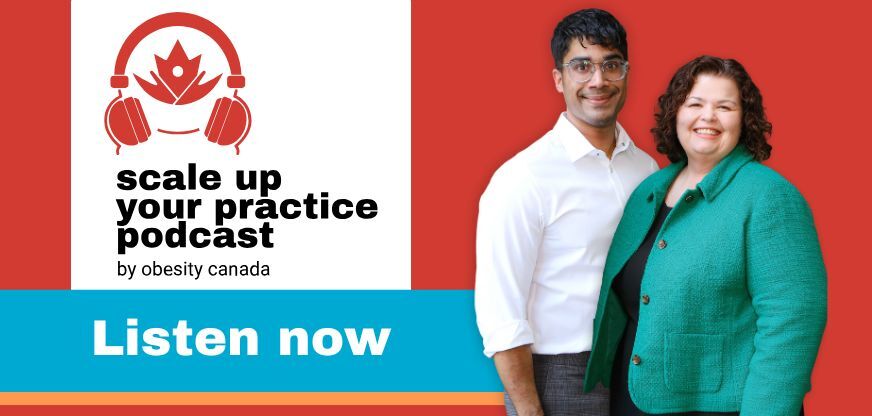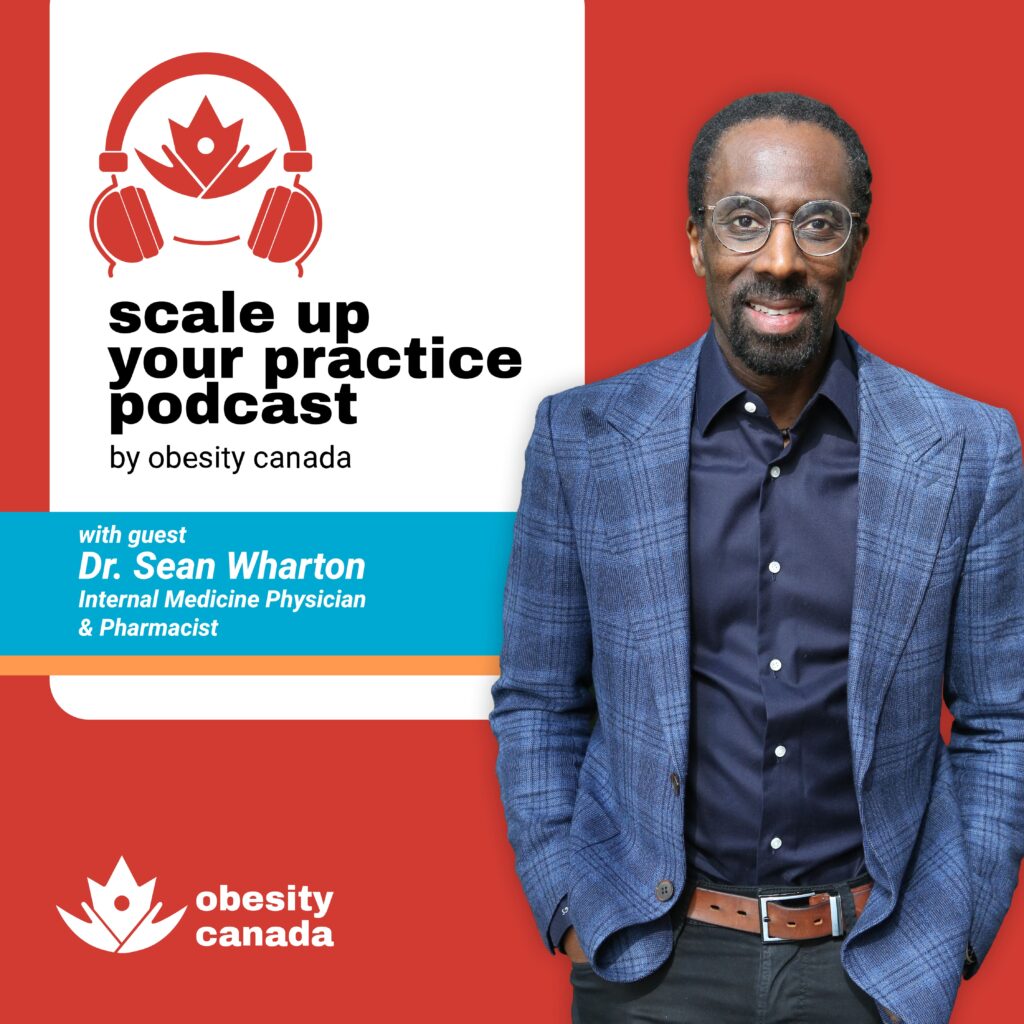– Hello and welcome to “The Scale Up Your Practice Podcast,” brought to you by Obesity Canada. I’m Roshan Abraham, an associate professor in the Department of Family Medicine at the University of Alberta. Besides educating medical learners, I’m deeply involved in the Obesity Canada Education Action Team. As a family physician, I witness daily the complex challenges of obesity, both at individual and system levels.
– And I’m Michelle McMillan, a lived experience expert with Obesity Canada and your co-host. We’re here to help you navigate the ever-evolving landscape of obesity management from multiple perspectives. Myself, a patient, Roshan, a medical professional, as well as the insights of our guests, all of whom work in the field of obesity.
– Today’s episode has been sponsored by Eli Lilly, Canada. Obesity Canada received an unrestricted educational grant for this episode. Today’s episode is the first of six in a series celebrating Canadian excellence, where we will meet with Canadian experts and learn a little bit more about them and how they got into the field of obesity. And now onto the interview. In today’s episode, we’re thrilled to welcome global obesity expert Dr. Sean Wharton.
– Thank you, Roshan and Michelle. This is great. It’s great to be here. Thank you.
– Thank you so much for joining us. Let’s start with you sharing just a little bit about yourself. I know that you are both a pharmacist and an internal medicine physician. That is quite the combination of skills. So maybe just tell us a little bit about yourself.
– Yeah, thanks a lot. That’s great. Yeah, I’m both a pharmacists and a physician. So I went to pharmacy school at the University of Toronto, and when I started there, it was interesting because there were four years of pictures on the wall in terms of the graduates, 170 people in each class. And there was in the fourth year class, I was in first year at the time, there was one other Black person. So there were like, you know, like 600 people at the school. And there was me and that other person. So there was very few ethnic representation throughout the entire school. That was challenging, but important. And that kind of helped me to try to start to understand the world of discrimination, the world of bias, the world of stigma, the world of fighting for what you believe in and not being recognized at times, which probably led to the obesity medicine world that I’m doing now. So it started there when I was 19 years old. So I finished in pharmacy. I became a pharmacist. I worked as a pharmacist. If you live in Toronto, you’ve seen me in a Shopper’s Drug Mart dispensing your medication at some point as I paid for my way through, like, medical school by working as a pharmacist. So I got into medicine at the University of Toronto. I finished at the University of Toronto. I always wanted to do medicine. I loved being a pharmacist, and if medicine didn’t work out, I would’ve loved being a pharmacist. I still love it, but I went into medicine because I was a pharmacist previously, the world of internal medicine, which has a lot of pharmacotherapy connected with it, and pharmacokinetics, and pharmacology, that’s the field that I ended up going into. And yeah. And then, I ended up landing in the obesity medicine space.
– So there’s a lot of things that I’m sure you’re proud of throughout your career. Is there something you wanted to share with our listeners, either personally or professionally that you’re extremely proud of?
– Yeah, you know, I think one of the most important things is the fact that I went out there, and instead of going into a specialty, I’m in internal medicine at this stage, I’m in my third year, and I have to choose a field that I want to go into, a specialist field. And there’s no obesity medicine specialist field, but I didn’t know exactly what I wanted to do, but I knew I wanted to work in the world of why people are discriminated against within medicine. And at that time it was high blood pressure. So, it was the fact that Black people had higher levels of complications due to hypertension, not necessarily more hypertension, just more complications, more death. And it was challenging to figure out why. And everybody thought, still, many people think it’s a biological issue when it’s not. It’s a biological issue. It’s a systemic discrimination issue. And the fact that so many people did not understand what systemic discrimination looks like or feels like was frustrating. So I decided to go into the internal medicine field to become a general internal medicine doctor and to do obesity medicine because obesity addressed all of these things as soon as Dr. Arya Sharma presented a talk on it. And I went to the talk, and I was amazed because it had aspects of the biological systems that I was interested in, the psychological aspects I was interested in, and the societal bias, stigma, and discrimination impacts. All of these things intersected, and so I felt that choosing this field that none of my other mentors in internal medicine would’ve told me to choose… They’re like, “No, go into cardiology. Go into nephrology. This is not a good idea, Sean. Don’t, you’re too bright. You’re too capable. Don’t go into obesity medicine.” And I said, “I’m going into obesity medicine because it makes sense to me. I resonate with it. I’m not living with obesity, but I’m living with bias, stigma, and discrimination, and people living with obesity are also. I connect with it. I’m going there.” And so that maybe was one of, you know, the proudest moments was to make that decision. It wasn’t an easy one. It was a big deal. A lot of people upset and who are, you know, coached me throughout my life and, but now look at me and say, you made the right choice. How did you know? So, but I think that was an important moment.
– Thank you for sharing that.
– Yeah, yeah. I mean, it’s a bold step to make a choice that isn’t popular both society-wise, and with your mentors as well. Like that’s a pretty bold decision to make. I thank you for all the people living with obesity that someone like yourself made that bold step. A lot of our listeners here are health professionals, and I think in some ways, they’ve already made the first step. They’re listening to this podcast, right? To get more information. And I know it’s a vast field, and you could probably lecture for six weeks on it, but if there was one thought around what you’d like our listeners to know about obesity management and working with their patients, what would be the first one on the top of your list?
– The first one is to be kind, so not about the medicine and the biology, and this to be humble, which as well involves being kind and being compassionate. When you can do that, you realize that you don’t know everything. I don’t know all the biological aspects of obesity medicine. I don’t know what each patient is living with, and what their challenges are, and why they’re either angry, or why they’re hopeful, or why they choose a path for management that I wouldn’t choose. And I’m advising them at times on a different path that’s been challenging to actually deal with and to handle as a physician. We’re accustomed to patients coming and sitting across the table from us for us to tell them what to do. The reason why you showed up across the table is because you want me the expert to tell you what to do. I’m good at that. Internists, we’re good at that on a regular basis. We needed to dispense of that, which was not easy at all. This is not an easy thing for a doctor to dispense of their paternalistic method of teaching a patient and telling a patient what to do, how to treat themself, what medication to take, and how this goes. So, I think that the idea of being kind and compassionate allows you to recognize that you don’t know everything and you shouldn’t push people around. You shouldn’t act like a parent and tell people what to actually do. You have to remind yourself that you’re in this together. And we always talk about in medicine being in this together. But I will tell you, we do not practice that in the majority of the fields. We do not. We say patient-centered care, and blah, blah, blah, blah, blah. It’s not true. We don’t do that. But in obesity medicine, I believe that it’s one place where if you don’t do that, you’ll have a terrible time practicing obesity medicine. This is the space where kindness, and compassion, and being humble about what we don’t know as of yet, gets you a long way. It allows you to be trusted. It allows you to do effective treatment.
– I honestly couldn’t agree more as a primary care physician that initially didn’t have much of an interest in obesity medicine, let alone obesity education. A lot of what you said resonates with me, and it’s sad that in medicine it’s come to this, right? It’s 2025 and we are still talking about patient-centered approaches to care, let alone relationship-focused or trauma-informed focuses. We still struggle with the patient-centered approach, and I do think the way Obesity Canada and a lot of other organizations approach obesity care, it is one of the few places both in the education realm as well as in the clinical realm where we do see that happen. So I just have to say that that definitely resonates with me, and I hope that that resonates with our listeners too, who some of whom hopefully are engaged in a more comprehensive care when it comes to patients living with obesity. Thanks everyone for joining us today. It was a pleasure to hear some of our guest’s background and celebrate them as a leader in the obesity space. To our listeners, we hope our discussion has been informative and has opened your mind to be curious about the evolving science in the fast-moving field of obesity.
– Help us spread the word. Share this podcast with a colleague who might find it helpful. And don’t forget to subscribe on your favorite podcast platform so you never miss an episode. We’d also love to hear what you think. Leave a review, not only to help us improve, but also to help more people discover the podcast. Do you have a topic you’d like us to cover? Send us your suggestions to scaleuppod@obesitycanada.ca. We value your thoughts and want to make this show helpful to you and all our listeners.
– And until next time, keep scaling up your practice. This podcast is intended for informational and educational purposes only and does not constitute medical advice. The content shared in this podcast should never be used as a substitute for professional medical advice, diagnosis, or treatment. Always seek the guidance of a qualified healthcare professional with any questions you may have regarding your health or a medical condition. The information and treatments discussed in this podcast are based on Canadian guidelines and approved practices as of the time of recording. If you’re listening from outside of Canada, please consult your local healthcare professional to ensure compliance with your region’s medical standards, guidelines, and recommendations. The creators of this podcast disclaim all liability for any decisions or actions taken based on the content discussed. Listening to this podcast does not establish a professional or patient-client relationship.


